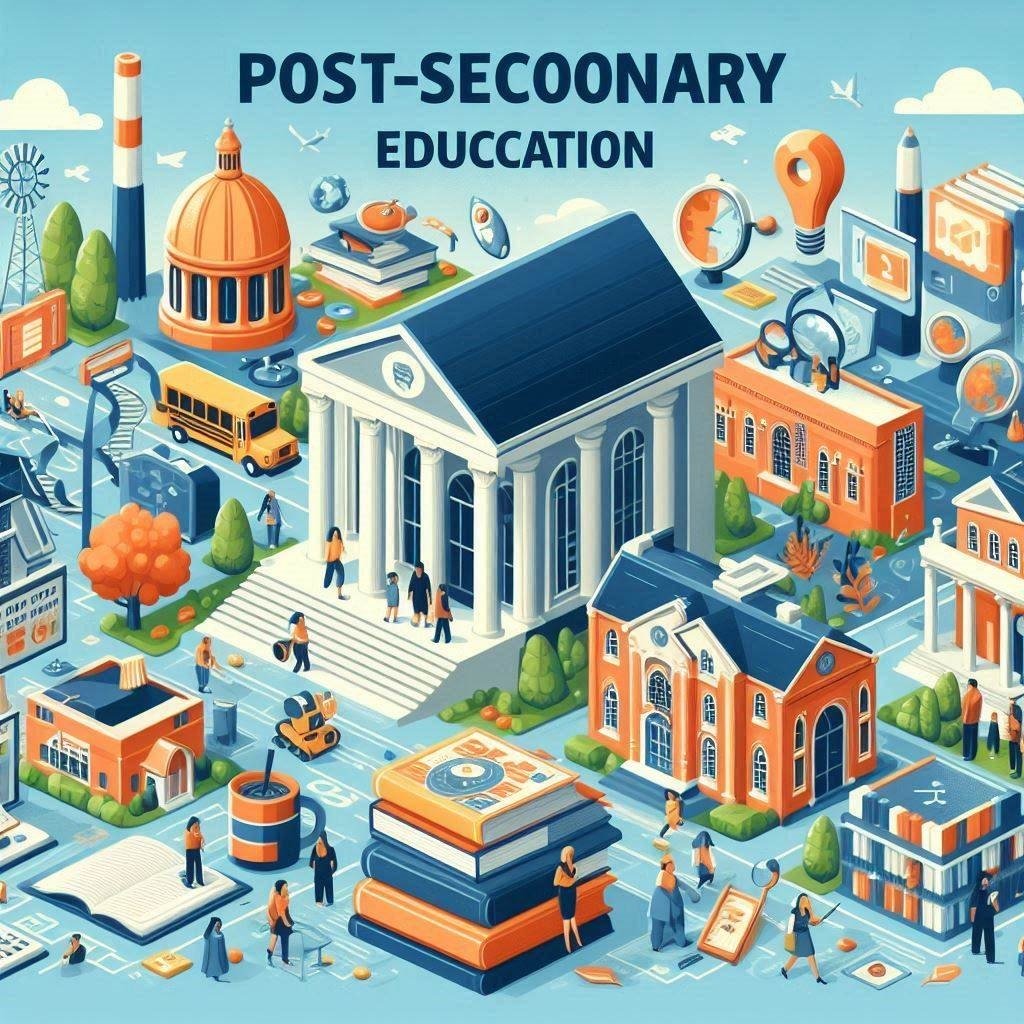Choosing the right path after high school is a big decision. Post-secondary education opens doors to new opportunities, career growth, and personal development. But with so many options available, it can be overwhelming to decide what’s best for you. This guide will help you understand the different types of post-secondary education, including colleges, trade schools, and more. We’ll explore their benefits, what to expect, and how to choose the right path for your future. Ready to launch your future? Let’s dive in!
What is Post-Secondary Education?
Post-secondary education refers to any form of education after high school. It includes colleges, universities, trade schools, and other specialized training programs. This education is crucial for acquiring advanced knowledge and skills needed in today’s job market.
Types of Post-Secondary Education
1. Colleges and Universities
Universities and colleges offer a wide range of academic programs leading to degrees like associate’s, bachelor’s, master’s, and doctorates.
Colleges
Colleges typically focus on undergraduate education. They offer associate’s and bachelor’s degrees in various fields such as arts, sciences, and business. Community colleges, a type of college, offer two-year associate degrees and often serve as a stepping stone to four-year universities.
Universities
Universities provide both undergraduate and graduate programs. They offer bachelor’s, master’s, and doctoral degrees. Universities often have a broader range of programs and research opportunities compared to colleges.
2. Trade Schools
Trade schools, also known as vocational or technical schools, offer specialized training in specific trades. These programs are typically shorter, ranging from a few months to two years, and lead to certificates or diplomas. Trade schools focus on hands-on training and prepare students for careers in fields like welding, cosmetology, plumbing, and automotive technology.
3. Online Education
Online education allows students to complete courses and degrees via the internet. This mode of learning offers flexibility and convenience, making it ideal for those who need to balance education with work or family commitments. Many reputable colleges and universities now offer online programs in various fields.
4. Apprenticeships
Apprenticeships combine on-the-job training with classroom instruction. They are common in trades such as carpentry, electrical work, and plumbing. Apprenticeships allow students to earn while they learn, providing practical experience and a pathway to certification or licensure in their chosen trade.
5. Certificate Programs
Certificate programs are short-term courses that provide specific skills and knowledge in a particular area. These programs are available at colleges, universities, and trade schools. They are ideal for individuals looking to enhance their skills or switch careers without committing to a full degree program.
Benefits of Post-Secondary Education
1. Better Career Opportunities
Post-secondary education opens doors to a wider range of job opportunities. Many high-paying and specialized jobs require advanced education and training. With a post-secondary degree or certificate, you increase your chances of securing a good job and advancing in your career.

2. Higher Earning Potential
Statistics show that individuals with post-secondary education earn more over their lifetimes compared to those with only a high school diploma. Higher education leads to better-paying jobs, which translates to financial stability and a higher quality of life.
3. Personal Growth and Development
Post-secondary education is not just about academics. It also fosters personal growth. You’ll develop critical thinking, problem-solving, and communication skills. You’ll learn to work independently and as part of a team, preparing you for the challenges of the real world.
4. Networking Opportunities
Colleges and universities provide numerous networking opportunities. You’ll meet peers, professors, and industry professionals who can offer guidance, mentorship, and job leads. Building a strong network is invaluable for your career development.
5. Specialized Knowledge and Skills
Trade schools and certificate programs offer specialized training that prepares you for specific careers. You’ll gain hands-on experience and practical skills that are directly applicable to your job. This focused education can lead to quicker employment and career advancement.
Exploring Your Options
Colleges and Universities
When considering colleges and universities, think about the following factors:
Academic Programs
Look for institutions that offer programs aligned with your interests and career goals. Research the curriculum, faculty, and available resources.
Location
Decide whether you want to study close to home or in a different city or country. Consider the cost of living, climate, and cultural environment.
Campus Life
Explore the campus facilities, student organizations, and extracurricular activities. A vibrant campus life can enhance your college experience.
Financial Aid
Investigate tuition costs and available financial aid options. Scholarships, grants, and student loans can help make college more affordable.
Trade Schools
When choosing a trade school, consider the following:
Accreditation
Ensure the school is accredited by a recognized accrediting body. Accreditation ensures the quality and credibility of the program.
Program Length and Cost
Compare the length and cost of different programs. Choose one that fits your budget and timeline.
Job Placement Services
Look for schools that offer job placement assistance. Strong industry connections can help you find employment after graduation.
Online Education
For online education, keep these factors in mind:
Accreditation
Verify that the online program is accredited. Accreditation ensures the program meets quality standards.
Flexibility
Choose a program that offers flexible scheduling and pacing. This is especially important if you have other commitments.
Technology Requirements
Make sure you have the necessary technology and internet access to participate in online classes. Some programs may require specific software or hardware.
Apprenticeships
When considering apprenticeships, think about the following:
Industry Demand
Choose a trade with strong job prospects. Research the demand for skilled workers in your chosen field.
Program Structure
Understand the structure of the apprenticeship program. This includes the length of the training, the balance between classroom instruction and on-the-job training, and the requirements for completion.
Earning Potential
Research the earning potential for your chosen trade. Apprenticeships often lead to well-paying jobs, but it’s important to know what to expect.
Certificate Programs
For certificate programs, consider these factors:
Relevance
Choose a program that is relevant to your career goals. Look for courses that offer up-to-date information and practical skills.
Duration
Compare the duration of different programs. Choose one that fits your schedule and allows you to gain skills quickly.
Cost
Evaluate the cost of the program and available financial aid options. Some employers may also offer tuition reimbursement for relevant courses.
Making an Informed Decision
Self-Assessment
Start by assessing your interests, strengths, and career goals. Consider what subjects you enjoy and what careers align with your passions and skills.
Research
Gather information about different post-secondary options. Use online resources, attend information sessions, and talk to current students and professionals in the field.
Seek Advice
Talk to your high school counselors, teachers, and family members. They can provide valuable insights and guidance based on their experiences.
Visit Campuses
If possible, visit the campuses of the colleges, universities, or trade schools you are considering. This will give you a feel for the environment and help you make an informed decision.
Financial Planning
Create a budget and explore financial aid options. Understand the costs associated with your chosen path and plan how to finance your education.
Tips for Success in Post-Secondary Education
Stay Organized
Keep track of assignments, deadlines, and important dates. Use planners, calendars, or digital tools to stay organized.
Develop Good Study Habits
Create a study schedule and stick to it. Find a quiet and comfortable study space, and minimize distractions.
Seek Help When Needed
Don’t hesitate to ask for help if you’re struggling with your coursework. Utilize campus resources like tutoring centers, libraries, and study groups.
Balance Work and Study
If you’re working while studying, manage your time effectively. Prioritize your tasks and avoid overcommitting.
Get Involved
Participate in extracurricular activities, join clubs, and attend events. This will enrich your college experience and help you build a strong network.
Conclusion
Post-secondary education is a critical step towards achieving your career goals and personal aspirations. Whether you choose a college, university, trade school, or another path, it’s important to make an informed decision. Consider your interests, strengths, and goals, and explore the various options available. With the right planning and commitment, you can launch your future and achieve success.
Additional Resources
College and University Search Tools
- College Board: Offers a comprehensive search tool for finding colleges and universities.
- U.S. News & World Report: Provides rankings and reviews of colleges and universities.
- Niche: Offers reviews and insights from current students and alumni.
Financial Aid Resources
- FAFSA: Apply for federal student aid for accredited programs.
- Scholarships.com: Search for scholarships based on your field of study and personal background.
- College Scholarship Service (CSS) Profile: Apply for financial aid from colleges and universities.
Career Exploration Tools
- Bureau of Labor Statistics: Provides information on job outlook, salaries, and required education for various careers.
- O*NET Online: Offers detailed descriptions of the world of work for use by job seekers, workforce development, and HR professionals.
Study Tools
- Quizlet: Create and study flashcards and other study tools.
- Khan Academy: Access free courses in various subjects to supplement your learning.
- Grammarly: A writing assistant to help with essays and reports.
Post-secondary education is a journey filled with opportunities and challenges. By understanding your options and making informed decisions, you can set yourself up for a successful and
